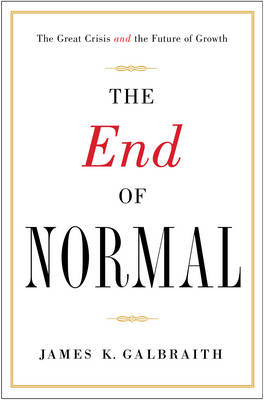
The End of Normal
The Great Crisis and the Future of Growth
Seiten
2014
Simon & Schuster (Verlag)
978-1-4516-4492-0 (ISBN)
Simon & Schuster (Verlag)
978-1-4516-4492-0 (ISBN)
- Titel ist leider vergriffen;
keine Neuauflage - Artikel merken
From respected thinker and economic iconoclast James K. Galbraith, a smart, scathing explanation for the economic crisis, and a vision for the future
Both sides and practically all analyses of the crisis so far take for granted that the economic growth from the early 1950s until 2000-interrupted only by the troubled 1970s-represented a normal performance. From this perspective the crisis was an interruption, caused by bad policy or bad people, and full recovery is to be expected if the cause is corrected.
The End of Normal challenges this view. Placing the crisis in perspective, Galbraith argues that the 1970s already ended the age of easy growth. The 1980s and 1990s saw only uneven growth, with rising inequality within and between countries. And the 2000s saw the end even of that-despite frantic efforts to keep growth going with tax cuts, war spending, and financial deregulation. When the crisis finally came, stimulus and automatic stabilization were able to place a floor under economic collapse. But they are not able to bring about a return to high growth and full employment.
Today, four factors impede a return to normal. They are the rising costs of real resources, the now-evident futility of military power, the labour-saving consequences of the digital revolution, and the breakdown of law and ethics in the financial sector. The Great Crisis should be seen as a turning point, a barometer of the rise of unstable economic conditions, which should be regarded as the new normal. Policies and institutions going forward should be designed, above all, modestly, to cope with this fact, maintaining conditions for a good life in difficult times.
Both sides and practically all analyses of the crisis so far take for granted that the economic growth from the early 1950s until 2000-interrupted only by the troubled 1970s-represented a normal performance. From this perspective the crisis was an interruption, caused by bad policy or bad people, and full recovery is to be expected if the cause is corrected.
The End of Normal challenges this view. Placing the crisis in perspective, Galbraith argues that the 1970s already ended the age of easy growth. The 1980s and 1990s saw only uneven growth, with rising inequality within and between countries. And the 2000s saw the end even of that-despite frantic efforts to keep growth going with tax cuts, war spending, and financial deregulation. When the crisis finally came, stimulus and automatic stabilization were able to place a floor under economic collapse. But they are not able to bring about a return to high growth and full employment.
Today, four factors impede a return to normal. They are the rising costs of real resources, the now-evident futility of military power, the labour-saving consequences of the digital revolution, and the breakdown of law and ethics in the financial sector. The Great Crisis should be seen as a turning point, a barometer of the rise of unstable economic conditions, which should be regarded as the new normal. Policies and institutions going forward should be designed, above all, modestly, to cope with this fact, maintaining conditions for a good life in difficult times.
James K. Galbraith holds the Lloyd M. Bentsen Jr. Chair in Government/Business Relations at the Lyndon B. Johnson School of Public Affairs at the University of Texas at Austin. He lives in Austin, Texas. The End of Normal is his first book.
| Erscheint lt. Verlag | 25.9.2014 |
|---|---|
| Zusatzinfo | index, notes |
| Verlagsort | New York |
| Sprache | englisch |
| Maße | 152 x 229 mm |
| Gewicht | 454 g |
| Themenwelt | Sachbuch/Ratgeber ► Beruf / Finanzen / Recht / Wirtschaft ► Wirtschaft |
| Geschichte ► Teilgebiete der Geschichte ► Wirtschaftsgeschichte | |
| Sozialwissenschaften ► Politik / Verwaltung ► Staat / Verwaltung | |
| Wirtschaft ► Betriebswirtschaft / Management | |
| Wirtschaft ► Volkswirtschaftslehre ► Finanzwissenschaft | |
| Wirtschaft ► Volkswirtschaftslehre ► Makroökonomie | |
| ISBN-10 | 1-4516-4492-2 / 1451644922 |
| ISBN-13 | 978-1-4516-4492-0 / 9781451644920 |
| Zustand | Neuware |
| Haben Sie eine Frage zum Produkt? |
Mehr entdecken
aus dem Bereich
aus dem Bereich
die Ukraine, Polen und der Irrweg in der russischen Geschichte
Buch | Hardcover (2023)
C.H.Beck (Verlag)
28,00 €
eine Globalgeschichte des Kapitalismus
Buch | Hardcover (2023)
C.H.Beck (Verlag)
38,00 €


